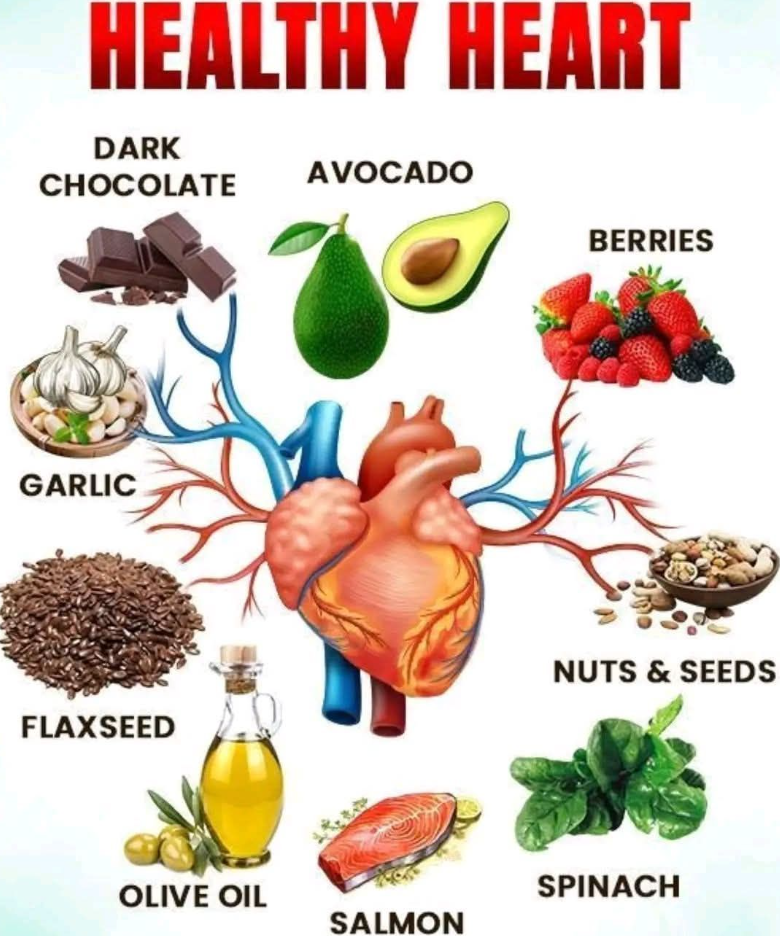Berries are bursting with antioxidants, fiber, and vitamins. They help:
-
Lower blood pressure
-
Reduce cholesterol
-
Fight inflammation
They’re also low in calories and naturally sweet — a win-win!
Try this: Add berries to your morning oats or smoothies.
3. Leafy Greens (Spinach, Kale, Swiss Chard)
These veggies are nutritional powerhouses full of:
-
Vitamin K (which helps protect arteries)
-
Nitrates (that help lower blood pressure)
-
Fiber and minerals
Leafy greens support healthy blood vessels and lower heart disease risk.
Quick meal idea: Toss spinach into soups, stews, or pasta.
4. Nuts (Walnuts, Almonds, Pistachios)
Nuts are rich in:
-
Healthy fats
-
Plant sterols
-
Magnesium
Eating a handful of unsalted nuts a few times a week has been linked to a reduced risk of heart attacks and strokes.
Snack tip: Mix almonds and walnuts with dried fruit for a satisfying, heart-healthy trail mix.
5. Whole Grains (Oats, Quinoa, Brown Rice)
Whole grains are packed with:
-
Soluble fiber (great for lowering bad cholesterol)
-
B vitamins
-
Iron and magnesium
They help improve heart health by lowering blood pressure and supporting healthy weight.
Easy switch: Replace white bread or rice with whole-grain alternatives.
6. Avocados
Avocados are a great source of:
-
Monounsaturated fats (which help lower LDL cholesterol)
-
Potassium (which helps control blood pressure)
They’re creamy, versatile, and packed with nutrients that support heart health.
Tip: Use mashed avocado instead of butter or mayo on toast or sandwiches.
7. Dark Chocolate (at least 70% cocoa)
Yes, chocolate can be heart-healthy — in moderation. Dark chocolate is rich in flavonoids, which help:
-
Improve blood flow
-
Reduce inflammation
-
Lower blood pressure
Stick to a square or two a day and skip those with added sugar or milk.
8. Legumes (Lentils, Beans, Chickpeas)
Legumes are high in:
-
Plant-based protein
-
Fiber
-
Iron and B vitamins
They help lower cholesterol, regulate blood sugar, and keep you full — all good news for your heart.
Try this: Make a hearty lentil soup or chickpea salad.
9. Olive Oil
A key ingredient in the heart-healthy Mediterranean diet, extra virgin olive oil is packed with:
-
Monounsaturated fats
-
Antioxidants (polyphenols)
It helps reduce inflammation and protect blood vessels.
How to use it: Drizzle over salads, veggies, or cooked grains.
❤️ Final Thoughts
Eating for heart health isn’t about deprivation — it’s about making delicious, smart choices that your body will thank you for. By incorporating these nine foods into your daily routine, you’re giving your heart the nutrients it needs to beat strong for years to come.
Simple Tips:
-
Eat more color (especially greens and berries)
-
Choose healthy fats over saturated and trans fats
-
Limit processed and sugary foods
-
Stay hydrated and keep active
Your heart will love you for it!
